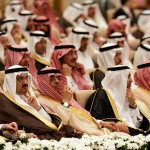Giving Globalization a Bad Name
 Jihadist oil barons and post-Soviet oligarchs who didn't gain their wealth through free enterprise systems are now big players. What's an American capitalist to do?
Jihadist oil barons and post-Soviet oligarchs who didn't gain their wealth through free enterprise systems are now big players. What's an American capitalist to do?
Chrystia Freeland has written an excellent piece in The Atlantic about the rise of the new global economic elite. Andrew Sullivan has pointed out a short piece by Carl Pope in Foreign Policy that reflects some of the concerns listed in the Freeland article. Pope's article includes the following passage:
Many have observed that countries whose boundaries happen to include large deposits of oil, diamonds, tropical timber, or some other valuable commodity tend to have miserable populations that suffer from poverty and violence -- the "resource curse." But we politely overlook the reality that for every resource-cursed country, there is a resource-blessed kleptocracy. With rare exceptions like Sudan, those who pillage their countries' wealth are accepted into the top ends of global society. They come to Davos, stay at the Four Seasons, bank in Switzerland. The oil oligarchs of the Persian Gulf are welcomed as investors in News Corporation and American banks, even when they hold views that might otherwise put them on a U.S. terrorism watch list.
Americans in general and American conservatives in particular routinely extol the benefits of free market capitalism, namely its ability to allow entrepreneurs to take risks that can enrich them while creating goods and services that benefit society. This is a good attitude to have, as American capitalism (which has included a strong state as part of its underpinnings, from Alexander Hamilton to this day) has been the greatest generator of prosperity for more people than any other economic system to date.
The problem is, in a global economy, there are very wealthy economic players who didn't gain their wealth by risking their personal capital or other voluntary business transactions. Trillions of dollars of investment worldwide, including in the US stock markets and other investment vehicles that middle-class Americans rely on for their well-being, is provided by sources that didn't become wealthy via libertarian means. Jihadist oil barons from the Middle East, post-Soviet oligarchs and executives from Chinese Communist Party-backed companies are just as welcome as investors and guests at posh resorts as Warren Buffett and Steve Jobs. They have a big place at the table in the global economy.
This doesn't justify general suspicion or envy of the wealthy. In fact, it's fair to say that these players didn't attain wealth through free enterprise means, so their sins don't say much about the free enterprise system. Further, as the Freeland piece points out, many of those who have gained great wealth (particularly in the United States) engage in self-critique of themselves and the economic system, and participate in large-scale philanthropy. But this does mean that those who defend globalization must at the very least acknowledge the importance of these less-savory players, and not simply dismiss those who raise questions about the current global economic order as merely being class warriors or socialist adversaries of business.